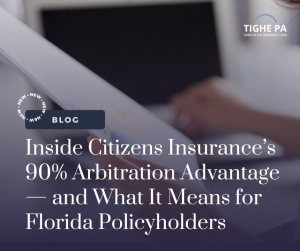In Florida, thousands of families are moving into homes that look brand new—but are already falling apart behind the walls. And by the time they find out, it’s often too late to do anything about it.
There’s something comforting about the word “new.” A new start. A new neighborhood. A new home that promises years of peace of mind. But in Florida, new construction isn’t always what it seems. Beneath the fresh stucco and glossy finishes, a silent crisis is unfolding—one that’s leaving homeowners with dangerous defects, skyrocketing repair bills, and little recourse.
This article explores how Florida’s booming construction industry is failing the very people it’s meant to serve. We’ll look at the systems that allow builders to escape accountability, the legal changes that tip the scales against homeowners, and what you can do if your dream home starts to crack—literally.
The Wake-Up Call in South Tampa
On the surface, these townhomes looked like a success story: modern design, a desirable location, and units that sold quickly. But just before the warranty expired, a homeowner noticed water intrusion. That observation led to a structural inspection—and a terrifying discovery. Wood rot had spread so extensively through the frames of multiple units that the buildings were declared unsafe.
“This is one of the worst cases I’ve seen in 30 years,” said structural engineer Tom Miller. “It was a life safety issue.”
The support beams had decayed to the point that collapse was not just possible—it was imminent. The city issued a notice: repair the structures within 72 hours or face condemnation. Emergency shoring was installed to prevent disaster.
What happened in South Tampa isn’t unique. Florida’s court dockets are filled with similar stories. In Hillsborough County alone, there are more than 300 open construction defect lawsuits. Each one represents a family or community facing unexpected and often devastating costs.
If you’re asking how these issues go undetected in brand-new homes, the answer lies in Florida’s construction process—and the gaps that leave homeowners vulnerable.
What’s Going Wrong Behind the Walls
To grasp how defects slip through the cracks, it helps to understand how the system is supposed to work—and how it often doesn’t.
Florida ranks among the top states for new home construction. But with rapid growth comes risk. Local building departments, overwhelmed by volume, increasingly allow developers to hire private inspectors instead of relying on municipal oversight. These private inspections are legal, but they lack the independence many assume is baked into the permitting process.
In Pasco County, for example, a post-investigation audit found that builders used private inspectors on nearly all new homes in one community—many of which were later found to have significant water and mold damage. One family had to move out twice within the first year due to black mold exposure.
At the same time, many builders outsource their work to subcontractors, sometimes unlicensed, often poorly supervised. Without strong quality control, critical components like window sealing, roofing, or strapping for hurricane resistance may be improperly installed.
By the time problems like water intrusion or structural failure appear, the home often looks fine from the outside. It’s only when leaks begin, or a wall shifts, or mold grows behind drywall that the real cost becomes visible.
And the legal protections for homeowners? They’re shrinking.
Laws That Protect Builders—Not Buyers
In 2023, Florida lawmakers passed Senate Bill 360, a subtle but significant piece of legislation. It reduced the statute of repose—the time homeowners have to file a lawsuit over latent construction defects—from 10 years to 7.
To the average person, three years might not sound like much. But when you consider that many structural issues don’t become obvious until long after move-in day, that shorter window can mean the difference between legal recourse and total financial loss.
The Edge Townhomes were built just six years ago. Had the damage been discovered a year later, homeowners would have been barred from suing. This law now sets a hard deadline, regardless of when the defect is discovered—even if it’s dangerously concealed behind a wall or floor.
In a state where hurricanes, humidity, and high water tables make waterproofing and structural integrity essential, these legal changes shift risk away from developers and onto everyday homeowners.
The Silence Clause: NDAs and the Price of Repairs
When builders do agree to fix problems, there’s often a catch.
More and more homeowners are being asked to sign non-disclosure agreements (NDAs) in exchange for repair work. On the surface, it may sound like a simple business arrangement. But these NDAs can have chilling effects: they prevent residents from warning neighbors, speaking to the press, or even participating in legal action if the same defect affects others in the community.
In other words, homeowners are being paid for their silence. That silence hides widespread problems, reduces pressure for reform, and allows the cycle to continue.
Accountability Without Teeth
You might assume that if a builder repeatedly constructs defective homes, their license would be revoked or suspended. But in Florida, enforcement is rare and penalties are weak.
The Department of Business and Professional Regulation (DBPR) is responsible for oversight—but fines, when issued, are often so small that builders treat them as just another line item in their budget.
“If you really want to change behavior,” said a former DBPR investigator, “start suspending licenses. Start banning repeat offenders from pulling permits.”
Until then, there’s no real deterrent. Builders who rush to meet profit goals are rewarded. Those who take the time to build safely and properly? They often lose bids.
That’s why change must come from both the top down—and the bottom up.
How Homeowners Can Protect Themselves
If you’re planning to buy a newly built home—or you already live in one—there are critical steps you can take to protect your investment and safety.
1. Hire an independent inspector. Don’t rely on the builder’s walkthrough. Bring in a licensed inspector who knows Florida’s building codes and has experience identifying water intrusion and structural issues.
2. Keep records. Take photos of every crack, stain, or leak. Document all conversations with your builder. If you suspect a problem, don’t wait.
3. Act quickly. Under current law, the window to file a construction defect claim is short. Don’t assume you have time to watch things unfold.
4. Don’t sign anything without legal advice. NDAs and repair agreements may limit your future rights. Consult a lawyer before you sign.
5. File a complaint if needed. If you suspect negligence, you can report the builder to the Florida Attorney General at (850) 414-3990.
Knowing your rights—and your risks—can make all the difference. But homeowners shouldn’t have to shoulder this burden alone.
Building Safer Homes Means Fixing the System
There are good builders in Florida—those who follow code, supervise subcontractors, and do the right thing even when no one is looking. But the current system punishes them by rewarding those who cut corners and silence complaints.
If we want safer homes, we need systemic reform:
- Longer timeframes to detect and report construction defects.
- Restrictions or bans on NDAs that hide public safety issues.
- Real enforcement from state regulators, including license suspensions for bad actors.
- Third-party oversight that can’t be bought or influenced by the builder.
This isn’t just about bad construction. It’s about the safety, security, and financial stability of hundreds of thousands of Floridians—many of whom saved for years to buy a home they believed would last.
Don’t Wait Until the Walls Start Crumbling
If you suspect construction defects in your home—or if you’re unsure what your rights are—Tighe P.A. is here to help. We’ve stood with homeowners across Florida who’ve been left with broken promises and hidden damage.
Don’t wait for the cracks to grow wider. Contact us to understand your legal options and protect your investment before it’s too late.
Tighe P.A. — Fighting for Florida homeowners. One case at a time.
Relevant Resources and Citations
- FOX 13 Investigates: Hidden defects in new construction homes and who’s to blame? Allie Corey, FOX 13 News, July 9, 2025
- Senate Bill 360 – 2023 Florida Legislature
- Hillsborough County Clerk of Courts – Construction Defect Case Filings
- Florida Department of Business and Professional Regulation (DBPR)
- Florida Office of the Attorney General – Consumer Complaint Hotline: (850) 414-3990
You May Also Like:
- Understanding the Drivers Behind Rising Homeowners Insurance Costs
- Patriot Select Takes Over 12,000 Citizens Policies—But Can Florida’s Newest Insurer Weather the Storm?
- How to Recognize an Insurance Claim Attorney Who Will Deliver Results
- How Can I Afford to Replace My Damaged Roof (or Other Damaged Property)?


